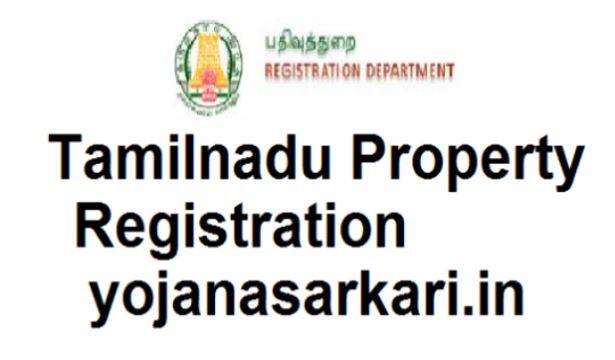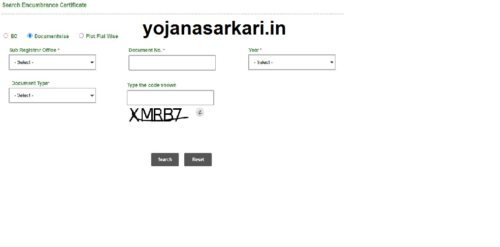Tamil Nadu Property Registration | Encumbrance Certificate | Application Process
The department that is responsible for property registration in the State of Tamil Nadu is the Department of Registration. Department of Registration looks after the services that are related to property like registration of documents and issue of encumbrance certificate. Around 9% of Tamil Nadu’s tax revenue comes from stamp duty registration.
Today in this article we are going to discuss everything about Tamil Nadu Property Registration like its objectives, documents required, the online registration process, stamp duty, important highlights, contact details, eligibility criteria, etc. So to know more about Tamil Nadu Property Registration stay connected with us.

Tamil Nadu Property Registration
Property registration in India is governed by the Registration Act of 1908. Registering your immovable property should be the top priority when you buy a house, shop, or land as it provides your legitimacy to carry out any transaction. A person is considered the legal owner of a property only after he gets the property registered in his name. The Department of Registration is liable for property registration in the State of Tamil Nadu.
Registration fees and stamp duty are not the same in all states of India so it’ll vary from state to state. The stamp duty is established on the agreement value or the market value and may vary from property to property and place to place. EC fees, Document preparation charges are other charges incurred.
| Tamil Nadu Property Registration Highlights | |
| About | Tamil Nadu Property Registration |
| State | Tamil Nadu |
| Department | Department of Registration |
| Benefit | Registration of property will be done |
| Beneficiaries | Residents of the state |
| Official Website | Click Here |
Tamil Nadu Property Registration Purpose
The purpose of Tamil Nadu Property Registration is as follows:-
- It serves for the proper recording of documents which provides more authenticity.
- The basic purpose of registration is to record the ownership of the property.
- To ensure prevention of fraud, conservation of evidence, transfer of title to the owner.
- By registering property, the document will maintain an up-to-date public record.
Benefits
The benefits availed under Tamil Nadu Property Registration are as follows:-
- Registration of property helps for proper recording of documents which provide more authenticity.
- By registering property, the document will maintain an up-to-date public record.
- To ensure the prevention of fraud, conservation of evidence, the transfer of title to the owner.
Documents Required
Applicant needs to have the following documents to register themselves on Tamil Nadu Property Registration:-
- Aadhar Card or Number
- PAN Card or Number
- Patta Passbook
- An ID card for executant and claimant (for all deeds)
- An ID card for witnesses ( for power deed only)
- Patta transfer application with court fee
- Duty stamped signed and executed document
- Two passport-sized photograph
- The claimant of the sale document must also sign in the sale deed and also appear before the registering officer for registration of the sale deed.
Eligibility Criteria
The applicant needs to pass the following eligibility criteria to register themselves on Tamil Nadu Property Registration:-
- Those who have landed in their names.
- Those who are legal heirs of the deceased landowner.
- Authorized signatory/ power of attorney.
Stamp Duty
The stamp duty is the percentage of transaction value levied by the state government, on every registered scale.
Tamil Nadu Property Registration Charges
Tamil Nadu Property registration charges in the state Tamil Nadu are stamp duty at 7% on the market value of the property registration fee of 1% of the value of the property. In the case of property registration on account of the exchange of property, stamp duty at 7% on the market value of the higher value property and registration fee of 1% of the value of the higher value property.
Stamp Duty and Registration Fees |
||
| Document Type | Stamp Duty | Registration Charges |
| Conveyance (Sale) | 7% of the market value of the property | 4% of the market value of the property |
| Gift | 7% of the market value of the property | 4% of the market value of the property |
| Exchange | 7% of the market value on the property that has the greater value | 4% of the market value on the property that has the greater value |
| Simple mortgage | 1% on the loan amount, subject to a maximum of Rs.40,000 | 1% on the loan amount, subject to a maximum of Rs.10,000 |
| Mortgage with possession | 4% of the loan amount | 1%, subject to a maximum of Rs. 2,00,000 |
| Agreement to sale | Rs. 20 | 1% on the money advanced (1% on total consideration if possession is given) |
| The agreement related to the construction of the building | 1% on the cost of the proposed construction or the value of construction or the consideration specified in the agreement, whichever is higher. | 1% on the cost of the proposed construction or the value of construction or the consideration specified in the agreement, whichever is higher. |
| Cancellation | Rs.50 | Rs.50 |
| Partition among family members | 1% on the market value of the property, subject to a maximum of Rs. 25,000 for each share | 1% subject to a maximum of Rs.4,000 for each share. |
| Partition among non-family members | 4% on the market value of the property for separated shares | 1% on the market value of the property for separated shares |
| Settlement in favor of family members | 1% on the market value of the property but not exceeding Rs.25,000 | 1% on the market value of the property, subject to a maximum of Rs.4,000 |
| Settlement in other cases | 7% on the market value of the property | 4% on the market value of the property |
| Partnership deed where the capital does not exceed Rs.500 | Rs.50 | 1% on the capital investment |
| Partnership deed(other cases) | Rs.300 | 1% on the capital invested |
| Memorandum of Deposit of Title Deeds | 0.5% on the loan amount, subject to a maximum of Rs.30,000 | 1% on the loan amount, subject to a maximum of Rs.6,000 |
| Lease below 30 years | 1% on the total amount of rent, premium, fine, etc. | 1% subject to a maximum of Rs. 20,000 |
| Lease up to 99 years | 4% on the total amount of rent, premium, fine, etc. | 1% subject to a maximum of Rs. 20,000 |
| Lease above 99 years or perpetual leave | 7% on the total amount of rent, a premium of advance, if any, payable | 1% subject to a maximum of Rs. 20,000 |
| Declaration of trust | Rs.180 | 1% on the amount |
- If you want to download public utility forms then click on the link given below
- Then on the home page, you’ll see the option of Sitemap, you have to click on that.
- Then on the left side, you’ll see the option of Public Utility Forms click on that, and the list of forms will appear in front of you.

Note:-During lockdown from 10-05-2021 to 24-05-2021, the Sub Registrar Offices will not function.
Property Registration Timing
Registration of property in the state of Tamil Nadu should be done within four months of executing the sale deed. If there will be any delay in the registration of property then you’ll have to give the following penalty as given below:-
- Up to one week:- 25% of the registration fee
- Up to one month:- 75% of the registration fee
- For four months:- 100% of the registration fee
The property registration must be done at the Sub-Registrar’s office under its jurisdiction, the property is situated or in the District Registrar office of that Registration District.
How to get your Encumbrance Certificate?
Follow the following steps to get your Encumbrance Certificate for Tamil Nadu Property Registration:-
- Firstly applicants need to go to the official website.
- Click on the E-Services tab on the menu bar, scroll you’ll see the option of Encumbrance Certificate.
- Click view EC, then select EC or Document-wise.
- If you select EC then you need to fill in the required information like zone, district, Sub-Registrar office, EC start date, EC end date, village, etc.
- Click search and you’ll get your EC certificate.
- If you choose Document-wise, you need to fill in the required details like Sub-registrar office, document number, year, and document type.
- Click search and you will get the EC certificate.
- EC online application gets processed in 3 to 4 days and the offline application takes 15 to 30 days.

How to Register?
Follow the following steps for registration:-
- As we all know, buying a property is not an easy task; you need to have a piece of complete knowledge. For this, you can consult a lawyer. Once your research is completed then you need to purchase stamp paper based on property registration charges. Ensure that stamp vendors must sell stamp paper at the stamp’s face value.
- Then a professional must draft the sale deed after purchasing the stamp paper. The following people can draft the sale deed:- Advocates, Licensed document writers, Chartered Accountants having document writing license.
- After that property registration must complete within four months of executing the sale deeds.
- The property registration must be completed at the Sub-Registrar’s office under its jurisdiction, the property is situated or in the District Registrar’s Office of that Registration district.
- The registrar returns the registered documents on the same day or within 3 days.
How can you verify your registered land records?
You can verify your registered land records through online mode. This service is provided by the Tamil Nadu state government through its e-Services portal. Users need to select the district, Taluk, village, and provide the survey number, sub-division and reference number to verify the document.
Contact Details
If you come across any query while registering yourself on Tamil Nadu Property Registration then you can take help from the following details:-
- Address:- No.100, Santhome High Road, Chennai-600028, Tamil Nadu, India
- Contact Details:-
- Telephone- 044-24640160
- Fax:- 044-24642774
- E-mail- [email protected]
Do read our other articles on our website:-Click Here
Note:- How did you like the information provided by us, please let us know in the comment section. For more details of any other scheme stay connected with us on https://yojanasarkari.in/. Thank you…



